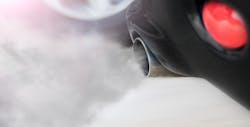Three Japan Automakers Admit False Emissions Data
Japan's Suzuki Motor, Mazda and Yamaha have admitted using false emissions data for some vehicles, the transport ministry said Thursday, in the latest product quality scandal to hit the country's auto sector.
The companies came forward after the ministry last month ordered 23 auto and motorbike companies to conduct in-house probes after it emerged Nissan and Subaru had cheated on fuel economy and emissions data.
All three reported "inappropriate handling" of vehicle inspections, the ministry said.
The companies admitted incomplete emissions tests were done on some of its vehicles, but their officials certified the results as though the tests had been administered fully.
Suzuki admitted improper inspections on 6,401 vehicles, or nearly half of those subject to sample checking, between 2012 and 2018.
Mazda said it 72 vehicles or 3.8% of those in its sample were affected, while Yamaha put the figure at 2.1% of its motorbike sample.
"This is extremely regrettable as this may cause doubts among automobile users about vehicle performance and the quality-control structures of automakers," Transport Minister Keiichi Ishii said in a statement.
The ministry said it would "examine their reports and take strict measures if necessary".
It said most of the 20 other companies asked to examine their data had reported no misconduct, while several others were still investigating.
Investors dumped shares of the three firms after the news.
Suzuki tumbled 6.04% to 6,944 yen, Mazda sank 1.30% to 1,327 yen and Yamaha Motor dived 4.63% to 2,820 yen.
The admissions are the latest in a string of scandals involving data falsification and testing standard breaches in Japan's key auto sector.
In July, Nissan admitted data on exhaust emissions and fuel economy had been "altered" for some of its vehicles, and last year the firm was forced to recall more than a million vehicles after admitting staff without proper authorization had carried out some inspections.
Copyright Agence France-Presse, 2018
About the Author
Agence France-Presse
Copyright Agence France-Presse, 2002-2025. AFP text, photos, graphics and logos shall not be reproduced, published, broadcast, rewritten for broadcast or publication or redistributed directly or indirectly in any medium. AFP shall not be held liable for any delays, inaccuracies, errors or omissions in any AFP content, or for any actions taken in consequence.
